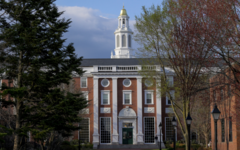In a bold legal move, Harvard University has initiated a federal lawsuit against the Trump administration, demanding an end to proposed cuts amounting to $2.2 billion in federal funding. This legal action, lodged on Monday, intensifies a conflict that escalated after the institution declined to comply with a series of demands issued by the administration aimed at regulating diversity initiatives and combatting anti-Semitism on campus. President Donald Trump recently halted funding, threatening not only the university’s financial support but also its tax-exempt status.
Harvard University Takes Legal Action Against Trump Administration Over Funding Cuts

Harvard University Takes Legal Action Against Trump Administration Over Funding Cuts
Harvard University has filed a lawsuit challenging the Trump administration's funding freeze, asserting significant implications for critical research initiatives.
Harvard’s president, Alan M. Garber, expressed serious concerns over the funding halt, noting its detrimental impact on vital research projects including studies on pediatric cancer, Alzheimer’s disease, and Parkinson’s disease. In a letter to the university community, he emphasized that the government’s actions are a broad attack on crucial funding partnerships, adding that the lawsuit addresses the administration’s intent to control academic decisions at Harvard by withholding federal funding.
In response, the White House defended its stance, branding the federal funding as a privilege that Harvard has failed to uphold under the specified criteria. White House spokesman Harrison Fields criticized the university for allegedly misusing taxpayer dollars.
Harvard is not alone; several other prestigious institutions, including Cornell University and Brown University, have also encountered threats of funding withdrawal. The situation has amplified discussions about federal influence over academic freedom, with Harvard staunchly refusing to surrender its independence or constitutional rights.
Moreover, the push to alter federal funding protocols seems motivated by broader political objectives, with implications for how institutions manage their diversity policies. The confrontation raises critical questions about the balance between federal oversight and institutional autonomy. As the legal battles unfold, the academic community remains watchful of the implications this could have on research funding and freedom in higher education.
In response, the White House defended its stance, branding the federal funding as a privilege that Harvard has failed to uphold under the specified criteria. White House spokesman Harrison Fields criticized the university for allegedly misusing taxpayer dollars.
Harvard is not alone; several other prestigious institutions, including Cornell University and Brown University, have also encountered threats of funding withdrawal. The situation has amplified discussions about federal influence over academic freedom, with Harvard staunchly refusing to surrender its independence or constitutional rights.
Moreover, the push to alter federal funding protocols seems motivated by broader political objectives, with implications for how institutions manage their diversity policies. The confrontation raises critical questions about the balance between federal oversight and institutional autonomy. As the legal battles unfold, the academic community remains watchful of the implications this could have on research funding and freedom in higher education.






















